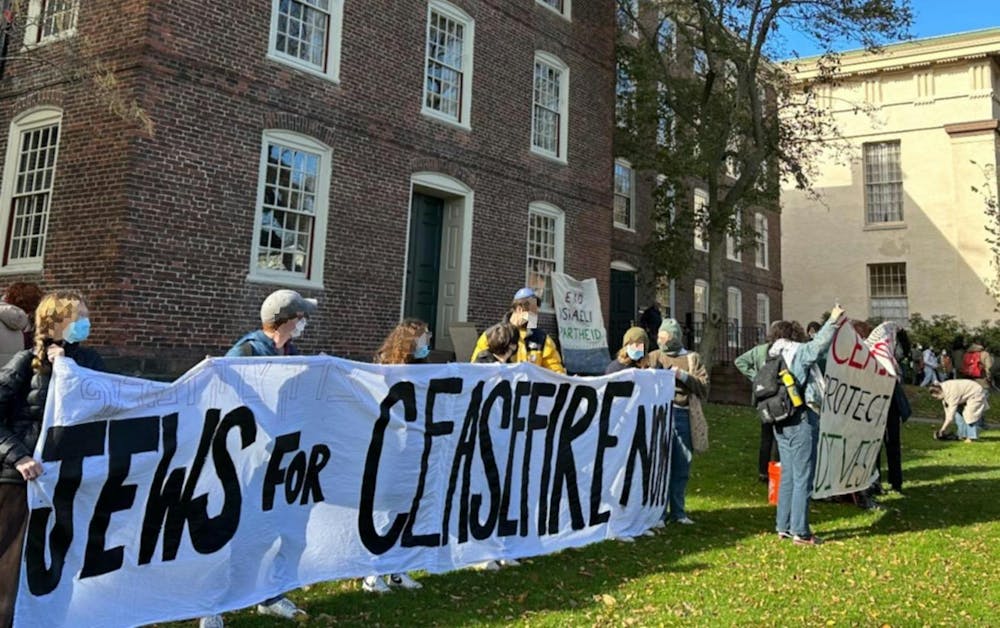On its first day of public activity, BrownU Jews for Ceasefire Now quickly became the center of attention on College Hill.
The group — officially announced Nov. 8, though some members signed a letter in The Herald under the title “Jews for Ceasefire Now” the day before — stemmed from informal gatherings that came soon after Hamas’s Oct. 7 attacks on southern Israel, according to Mica Maltzman ’25 and Rita Feder ’24, two representatives from JFCN.
In just under a month, the meetings led to a Nov. 8 sit-in at University Hall in which 20 students were arrested and charged with willful trespass. At the sit-in, they demanded Brown “promote an immediate ceasefire and a lasting peace by divesting its endowment from companies that enable war crimes in Gaza,” according to an Instagram post.
At initial meetings, students concerned about Israel’s response to the attacks gathered to grieve and process their emotions.
Edie Fine ’25, who participated in the sit-in, said the gatherings served as an “affinity space” in which numerous students expressed a desire to support pro-Palestinian advocacy.
There was “no possible way that we could spend time in a room engaging with our own feelings and emotions and not emerge with an urgency and a compulsion to act,” Fine added.
Feder said she hoped to use the group’s platform as Jewish students to “disrupt the narrative that there is a monolithic Jewish voice that stands solely in support of the military actions of the State of Israel.”
“It was important for us to show that there are Jews who view the safety of Israelis and Jews not as mutually exclusive from the safety and security of Palestinians, but actually as inextricably intertwined,” Feder said.
As demands for the University to divest or call for a ceasefire went unmet by the University, a few JFCN group members proposed “escalating the call,” according to Feder.
Fine cited the University’s history of student activism through sit-ins as one of JFCN’s primary motivations for choosing to occupy University Hall on Nov. 8.
Many JFCN members met on the night of Nov. 6 — two days before the sit-in — at the house of a member to formulate a plan and discuss all possible outcomes, Fine said. For safety and visibility reasons, the group aimed to reach a “critical mass” of 20 students who would participate in the sit-in before following through, according to Fine.
“It was a risky move,” Feder said. “People knew the potential consequences, and some people weren’t in a position to take those risks.”
The group’s primary focus was ensuring that all participants felt emotionally prepared with “no unanswered anxieties,” Fine said.
Fine said the decision was not taken lightly, but the “yes” came immediately. “I knew what my instincts were, and I knew I had to trust them,” they said.
The meeting ended with only 15 students willing to sit in. But JFCN’s outreach over the next two days garnered enough support to follow through with the group’s plans on Nov. 8. Twenty students physically occupied University Hall that day, but more than 40 students were prepared to sustain the participants until demands were met, according to Feder.
JFCN shares some members with Talk for Tomorrow, a group of anonymous, multicultural students that held an Oct. 18 vigil to mourn Palestinian and Israeli victims, Feder wrote in a message to The Herald. Prior to the vigil, Talk for Tomorrow released an open letter addressed to Paxson, calling on her “to protect Palestinians and those advocating for Palestinian rights on campus.”
According to Feder, who has been involved with Talk for Tomorrow, the group is “not dead,” though many members are currently “at capacity.” Still, Feder hopes that the group will continue to be a space for people to “talk to each other on how to engage in difficult issues and humanize each other.”
Fine believes there are over 100 students currently involved in JFCN — now focused on ensuring the sit-in did not go unnoticed. Since the group’s demands were not met, Feder previously told The Herald that JFCN is “a voice that will only get louder.”
Julianna Chang was the managing editor of production and development of The Herald's 135th Editorial Board. She previously served as a university news editor overseeing the academics & advising and student government beats. A junior from the Bay Area, Julianna is studying Biology and Political Science on the pre-medical track. When she's not in class or in the office, she can be found eating some type of noodle soup and devouring bad books.





